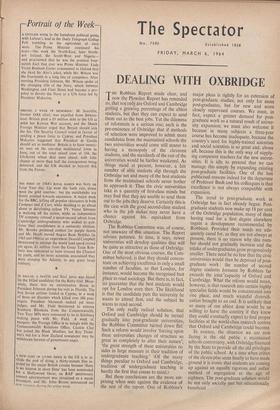DEALING WITH OXBRIDGE
THE Robbins Report made clear, and now the Plowden Report has reminded us, that not only are Oxford and Cambridge getting a growing percentage of the ablest students., but that they can expect to send- them out to the best jobs. Yet the dilemma of reformists is a serious one; such is the pre-eminence of Oxbridge that if methods of selection were improved to admit more candidates from the maintained schools the two universities would come still nearer to having a monopoly of the cleverest students, and the standards of the rest of the universities would be further weakened. As things stand at present, however, a fair number of able students slip through the Oxbridge net and many of the best students from the maintained schools never bother to approach it. Thus the civic universities take in a quantity of first-class minds but may find that they are unable to send them out to the jobs they deserve. Certainly this is the case with the good second-class student who in the job stakes may never have a chance against his, equivalent from Oxbridge.
The Robbins Committee was, of course, not unaware of this situation. The Report advises patience. In time, it says, newer universities will develop qualities that will be quite as attractive as those of Oxbridge. One of the most obvious courses, the Com- mittee believed, is that they should concen- trate on achieving excellence in only a small number of faculties, so that Londbn, for instance, would become the recognised best place to read sociology. But there is, in fact, no guarantee that the best students would opt for London even then. The likelihood is that the candidate puts the university he wants to attend first, and the subject he wants to read second.
The only really radical solution, that Oxford and Cambridge should be turned gradually into post-graduate universities, the Robbins Committee turned down flat. Such a reform would involve 'forcing upon these universities changes of structure so great as completely to alter their nature'; 'the great strength of these universities re- sides in large measure in their tradition of undergraduate teaching.' (Of the many things peculiar to Oxford and Cambridge, tradition of undergraduate teaching is hardly the first that comes to mind.) But these conclusions are the more sur- prising when seen against the evidence of the rest of the report. One of Robbins's major pleas is rightly for an extension of post-graduate studies; not only for more post-graduates, but for new and more closely supervised courses. We must, in fact, expect a greater demand for post- graduate work as a natural result of univer- sity expansion; we must also welcome it because ' in many subjects a three-year course has become inadequate, because the country's need for highly-trained scientists and social scientists is so great and, above all, because this is the only way of stipply- ing competent teachers for the new univer- sities. It is idle to pretend that we can manage this simply by expanding existing post-graduate facilities. One of the less publicised reasons indeed for the departure of Professor Bush and his colleagues is that excellence is not always compatible with expansion.
The trend to post-graduate work in Oxbridge has in fact already begun. Post- graduate students now make up 18 per cent of the Oxbridge population, many of them having read for a first degree elsewhere (again a development recommended by Robbins). Provided their needs are ade- quately cared for, as they are not always at present, there is no reason why this num- ber should not gradually increase and the intake of undergraduates grow progressively smaller. There need be no fear that the civic universities would then be deprived of post- graduate work : the number of second degree students foreseen by Robbins far exceeds the joint 'capacity of Oxford and Cambridge. What the reform would mean, however, is that research into certain highly specialist fields would be concentrated into one place, and much wasteful diversifi- cation brought to an end. It is unlikely that so many of our ablest dons would be so willing to leave the country if they knew they could eventually expect to'find proper facilities at the world-class research centres that Oxford and Cambridge could become.
In essence, the situation we are now facing is the old public v. maintained schools controversy, with Oxbridge financed by the State to provide all the old privileges of the public school. At a time when critics of the eleven-plus seem finally to have made .ground it is ironic that students are coming up against an equally rigorous and unfair method of segregation at the age of eighteen. The post-graduate solution would be not only socially just but educationally beneficial.


































 Previous page
Previous page